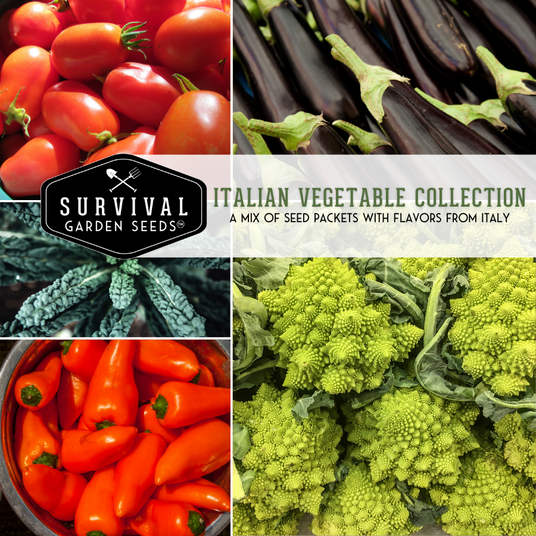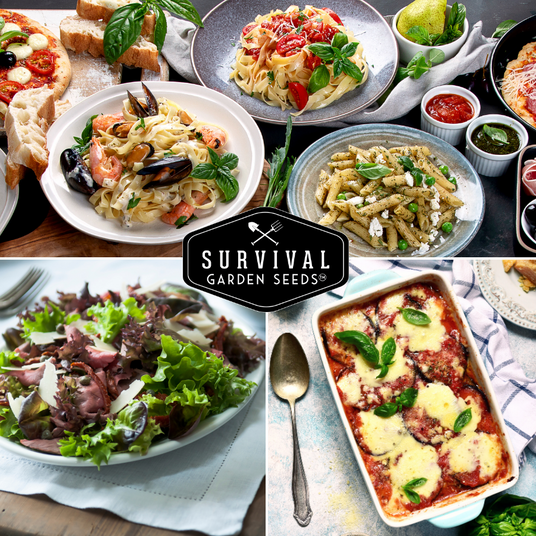Italian Seed Collection – Classic Heirloom Vegetables for Authentic Flavor and Productive Home Gardens
Heirloom - Non-GMO - Reliable Germination
Italian Seed Collection – Classic Heirloom Vegetables for Authentic Flavor and Productive Home Gardens is backordered and will ship as soon as it is back in stock.
Couldn't load pickup availability
Bring timeless Italian flavors to your home garden with the Italian Seed Collection from Survival Garden Seeds. This curated mix features six well-loved vegetables—Romanesco Broccoli, Black Beauty Eggplant, Lacinato Kale, Lolla Rossa Lettuce, Marconi Red Pepper, and Roma Tomato—chosen for their dependable growth and rich culinary potential. Ideal for outdoor beds, greenhouses, raised planters, or hydroponic systems, these varieties adapt easily to different garden setups and offer abundant harvests across the season.
Whether you’re cooking fresh summer meals or preparing long-term pantry staples, this collection helps you create flavorful sauces, soups, and preserved goods inspired by Old World traditions. Each seed packet includes clear instructions for germination, light requirements, and seed saving, making it a supportive choice for beginners and experienced growers alike.
Classic Italian Vegetables Included:
- Romanesco Broccoli: Also known as broccoflower or Romanesco cauliflower, this striking vegetable has a nutty flavor and firm texture. Excellent fresh or frozen, and a practical addition to homestead or survival gardens.
- Black Beauty Eggplant: A beloved heirloom with glossy deep-purple skin and a classic bell shape. Produces reliable harvests for grilling, roasting, and canning.
- Lacinato (Dinosaur) Kale: A staple leafy green with blue-green, textured leaves. Tender enough for salads and kale chips, yet hearty enough for soups and stews.
- Lolla Rossa Lettuce: Beautiful magenta-green leaves form loose, frilly heads with a mild, versatile flavor—ideal for salads, sandwiches, and fresh garden meals.
- Marconi Red Pepper: A long, sweet Italian pepper that performs well in containers or garden beds. Excellent for sauces, sautéing, and canning.
- Roma Tomato: A classic tomato for preserving, with dense flesh and rich flavor perfect for sauces, pastes, and dehydrating.
Why Customers Love the Italian Seed Collection:
- Includes six classic vegetables used in traditional Italian cooking
- Suitable for gardens, greenhouses, raised beds, and hydroponic systems
- Ideal for fresh eating, canning, freezing, and long-term storage
- Reliable, productive varieties that support year-round food planning
- Beginner-friendly with clear growing instructions in each packet
How to Grow:
Start seeds indoors or in a protected environment for best results, especially for tomatoes, peppers, and eggplants. Provide bright light and warm temperatures for strong early growth. Transplant outdoors after the danger of frost has passed, choosing a location with full sun and nutrient-rich, well-drained soil. Leafy greens like kale and lettuce can also be direct-sown as conditions allow. Water consistently and harvest regularly to encourage continued production.
Heirloom Garden Seeds
All of our seeds are open-pollinated, non-GMO, heirloom varieties with tested germination rates
Payment & Security
Payment methods
Your payment information is processed securely. We do not store credit card details nor have access to your credit card information.

Grow the Freshest Ingredients

Grow Together
Why Choose Survival Garden Seeds
At Survival Garden Seeds, we believe in preparing today for tomorrow’s peace of mind. That’s why we offer only heirloom, non-GMO, and untreated seeds you can trust to nourish your family and support a sustainable lifestyle. As a family-owned American company, we’re committed to providing seeds that grow strong and true—helping you cultivate health, resilience, and beauty in your garden.
Frequently Asked Questions
Are your seeds heirloom and open-pollinated?
Are your seeds heirloom and open-pollinated?
Yes. All of our seeds are heirloom, open-pollinated varieties, which means they can produce seeds that grow true to type and are suitable for seed saving.
You can learn more about open-pollinated, heirloom, and non-GMO seeds in our Survival Garden Training blog.
Are your seeds non-GMO?
Are your seeds non-GMO?
Yes. All Survival Garden Seeds are 100% non-GMO. Our seeds are open-pollinated heirloom varieties and are never genetically modified.
Are your seeds treated with chemicals?
Are your seeds treated with chemicals?
No. Our seeds are completely untreated and free from chemical coatings, fungicides, or synthetic treatments.
How do I know my seeds are fresh?
How do I know my seeds are fresh?
Every seed packet includes a packed-for date, and we germination-test each seed lot before packaging to ensure high viability.
What is the shelf life of your seeds?
What is the shelf life of your seeds?
Most seeds remain viable for 3 to 5 years or longer when stored properly in a cool, dry place away from light and moisture.
In what USDA hardiness zones can I grow your seeds?
In what USDA hardiness zones can I grow your seeds?
Our varieties are selected to grow successfully across USDA Hardiness Zones 3 through 10. Each packet includes variety-specific planting guidance and germination tips.












